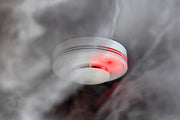
Can Vapes Trigger Fire Alarms? These last years, vaping has become an increasingly popular alternative to traditional smoking. However, as vaping gains traction, questions about its safety and potential risks have also emerged. Whether vapes may set off fire alarms is one such topic.
The physics of fire alarms, the makeup of vape aerosols, and the situations in which vaping might trigger a fire alarm are all covered in detail in this article.
After reading through this thorough tutorial, you'll know exactly how vaping affects fire alarm systems and what you can do to prevent needless interruptions.
How Do Fire Alarms Work?
To understand whether vapes can trigger fire alarms, it’s essential to first grasp how fire alarms function. Fire alarms are designed to detect the presence of smoke, heat, or other indicators of fire. There are primarily two types of fire alarms commonly used:
-
Ionization Fire Alarms: These alarms are highly sensitive to small smoke particles, making them ideal for detecting fast-flaming fires. They work by ionizing the air between two electrically charged plates, which creates a current. When smoke enters the chamber, it disrupts this current, triggering the alarm.
-
Photoelectric Fire Alarms: These alarms are more responsive to larger smoke particles, such as those produced by smoldering fires. They use a light source and a sensor. When smoke enters the chamber, it scatters the light, which is then detected by the sensor, setting off the alarm.
Additionally, some fire alarms combine both technologies, known as dual-sensor alarms, to provide comprehensive fire detection.
Does Vaping Affect Blood Vessels? Does Vaping increase Blood Pressure?
What Are Vapes Made Of?
Vapes, or electronic cigarettes, work by heating a liquid (commonly referred to as e-liquid or vape juice) to produce an aerosol, often mistaken for water vapor. The primary components of e-liquid include:
-
Propylene Glycol (PG): A synthetic compound used to create a throat hit similar to traditional cigarettes.
-
Vegetable Glycerin (VG): A thicker liquid that produces denser vapor clouds.
-
Nicotine: An optional addictive substance found in varying concentrations.
-
Flavorings: Food-grade additives that provide a wide range of flavors.
When heated, these components transform into an aerosol, which is then inhaled by the user. The aerosol consists of tiny particles that can linger in the air, depending on the environment and ventilation.
Can Vapes Trigger Fire Alarms?
The short answer is yes, vapes can trigger fire alarms, but the likelihood depends on several factors, including the type of fire alarm, the proximity to the alarm, and the density of the vapor produced.
1. Ionization Fire Alarms and Vaping
Since ionisation alarms are extremely sensitive to minute particles, vaping's tiny aerosol particles have the potential to set them off.
An ionisation detector may detect vapour as smoke and trigger a warning if you vape close to it, particularly in a small area with little ventilation.
2. Photoelectric Fire Alarms and Vaping
Since photoelectric alarms are made to detect bigger smoke particles, vaping is less likely to set them off. The vapour may still disperse the light beam within the alarm, though, if it is dense enough, perhaps setting it off.
3. Dual-Sensor Fire Alarms and Vaping
Dual-sensor alarms are more adaptable but also more vulnerable to vaping-induced activation since they include both ionisation and photoelectric technologies. Be very careful if there are dual-sensor alarms in the area.
Factors That Increase the Risk of Triggering Fire Alarms
While vaping can trigger fire alarms, certain factors increase the likelihood of this happening:
-
Proximity to the Alarm: Vaping directly under or near a fire alarm significantly raises the risk of setting it off.
-
Ventilation: Poorly ventilated spaces allow vapor to accumulate, increasing the chances of triggering an alarm.
-
Vapor Density: High-VG e-liquids produce thicker vapor clouds, which are more likely to set off alarms.
-
Frequency of Vaping: Taking many fast breaths at once or chain vaping can produce a dense cloud of vapour, which raises the danger even more.
How to Prevent Vaping from Triggering Fire Alarms?
If you’re a vaper, there are several steps you can take to minimize the risk of setting off fire alarms:
-
Vape in Well-Ventilated Areas: Ensure that the space you’re vaping in has adequate airflow to disperse the vapor quickly.
-
Avoid Vaping Near Fire Alarms: Maintain a safe distance from fire alarms to reduce the chances of triggering them.
-
Use Low-VG E-Liquids: Opt for e-liquids with a higher PG ratio, as they produce less dense vapor.
-
Blow Vapor Downward: Exhale vapor toward the ground rather than upward, where it’s more likely to reach the alarm.
-
Install Vape-Friendly Alarms: In private spaces, consider using heat detectors instead of smoke detectors, as they are less sensitive to vapor.

Common Misconceptions About Vaping and Fire Alarms
Regarding vaping and its potential to set off fire alarms, there are a number of false beliefs. Let's disprove some of them:
1. Vapor Is Just Water
Vape aerosol is often mistaken for innocuous water vapour. Actually, it's a concoction of particles and chemicals that can cause problems for fire alarm systems.
2. All Fire Alarms Are the Same
As was previously mentioned, the sensitivity of various fire alarm kinds varies. You can evaluate the danger more effectively if you know what kind of alert is present in your surroundings.
3. Vaping Indoors Is Always Safe
While vaping is generally considered safer than smoking, it’s not entirely risk-free, especially when it comes to fire alarms and indoor air quality.
Legal and Safety Implications
There might be severe repercussions if a vape sets off a fire alarm, especially in public areas or shared housing. Inaccurate alarms may result in:
-
Fines or Penalties: Unnecessary activation of fire alarms is punishable by fines in several countries.
-
Evacuations: Unnecessary evacuations brought on by false alarms might interfere with public services and enterprises.
-
Damage to Reputation: Frequently receiving false alarms might harm your reputation, particularly in situations where you live or work with others.
In conclusion, it is true that vapes can set off fire alarms, especially in settings where dual-sensor or sensitive ionisation alarms are present.
You may enjoy vaping without running the danger of setting off fire alarms by being aware of how they operate and following the necessary safety measures.
To reduce any possible interruptions, always pay attention to your surroundings, select the appropriate e-liquids, and make sure there is enough ventilation.
Will Vape Smoke Set Off Fire Alarms?
As vaping continues to grow in popularity, questions about its impact on everyday life have become more prevalent. Whether vape smoke may trigger fire alarms is one of the most often asked questions.
The connection between vaping and fire alarm systems is thoroughly examined in this essay. We'll look at the science underlying fire alarms, the makeup of vape smoke, and the particular circumstances in which vaping may cause an alert.
You will have a comprehensive grasp of how vaping and fire alarms interact by the end of this book, along with the actions you can take to prevent needless interruptions.
What are the Fire Alarm Systems?
Knowing how these systems work is essential to figuring out whether vape smoke can trigger fire alarms. The purpose of fire alarms is to identify fire symptoms such smoke, heat, or combustion particles. There are two main kinds of fire alarms:
-
Ionization Fire Alarms: These alarms are highly sensitive to small smoke particles, making them effective at detecting fast-flaming fires. They work by ionizing the air between two electrically charged plates, creating a current. When smoke enters the chamber, it disrupts this current, triggering the alarm.
-
Photoelectric Fire Alarms: Larger smoke particles, such those released by smouldering fires, are more easily detected by photoelectric fire alarms. They make use of a sensor and a light source. The alarm is triggered when smoke enters the chamber because it scatters the light, which the sensor detects.
Dual-sensor alarms are a type of fire alarm that combines both technologies to give thorough fire detection.
What Is Vape Smoke Made Of?
Contrary to popular belief, vape smoke is not actually smoke but an aerosol. This aerosol is produced by heating an e-liquid, which typically contains the following components:
-
Propylene Glycol (PG): A synthetic compound that creates a throat hit similar to traditional cigarettes.
-
Vegetable Glycerin (VG): A thicker liquid that produces denser vapor clouds.
-
Nicotine: An optional addictive substance found in varying concentrations.
-
Flavorings: Food-grade additives that provide a wide range of flavors.
When heated, these components transform into an aerosol, which is then inhaled by the user. This aerosol consists of tiny particles that can linger in the air, depending on the environment and ventilation.
Can Vape Smoke Set Off Fire Alarms?
The answer is yes, vape smoke can set off fire alarms, but the likelihood depends on several factors, including the type of fire alarm, the proximity to the alarm, and the density of the vapor produced.
1. Ionization Fire Alarms and Vape Smoke
Since ionisation alarms are extremely sensitive to minute particles, vaping's tiny aerosol particles have the potential to set them off. An ionisation detector may detect vapour as smoke and trigger a warning if you vape close to it, particularly in a small area with little ventilation.
2. Photoelectric Fire Alarms and Vape Smoke
Since photoelectric alarms are made to detect bigger smoke particles, they are less likely to be set off by vape smoke. The vapour may still disperse the light beam within the alarm, though, if it is dense enough, perhaps setting it off.
3. Dual-Sensor Fire Alarms and Vape Smoke
Dual-sensor alarms are more adaptable but also more vulnerable to being set off by vape smoke since they include both ionisation and photoelectric technologies. Be very careful if there are dual-sensor alarms in the area.
Factors That Increase the Risk of Triggering Fire Alarms
Although vape smoke has the potential to activate fire alarms, the following variables make this more likely to occur:
-
Proximity to the Alarm: Vaping directly under or near a fire alarm significantly raises the risk of setting it off.
-
Ventilation: Poorly ventilated spaces allow vapor to accumulate, increasing the chances of triggering an alarm.
-
Vapor Density: High-VG e-liquids produce thicker vapor clouds, which are more likely to set off alarms.
-
Frequency of Vaping: Taking many fast breaths at once or chain vaping can produce a dense cloud of vapour, which raises the danger even more.
How to Prevent Vape Smoke from Setting Off Fire Alarms
Regarding vape smoke and its potential to set off fire alarms, there are a number of false beliefs. Let's disprove some of them:
-
Vape in Well-Ventilated Areas: it's a concoction of particles and chemicals that can cause problems for fire alarm systems. .
-
Avoid Vaping Near Fire Alarms: Maintain a safe distance from fire alarms to reduce the chances of triggering them.
-
Use Low-VG E-Liquids: Opt for e-liquids with a higher PG ratio, as they produce less dense vapor.
-
Blow Vapor Downward: Exhale vapor toward the ground rather than upward, where it’s more likely to reach the alarm.
-
Install Vape-Friendly Alarms: In private spaces, consider using heat detectors instead of smoke detectors, as they are less sensitive to vapor.
Common Misconceptions About Vape Smoke and Fire Alarms
There are several misconceptions surrounding vape smoke and its ability to trigger fire alarms. Let’s debunk a few of them:
1. Vapor Is Just Water
Vape aerosol is often mistaken for innocuous water vapour. Actually, it's a concoction of particles and chemicals that can cause problems for fire alarm systems.
2. All Fire Alarms Are the Same
As was previously mentioned, the sensitivity of various fire alarm kinds varies. You can evaluate the danger more effectively if you know what kind of alert is present in your surroundings.
3. Vaping Indoors Is Always Safe
While vaping is generally considered safer than smoking, it’s not entirely risk-free, especially when it comes to fire alarms and indoor air quality.
Legal and Safety Implications
Vape smoke can have major repercussions if it sets off a fire alarm, especially in public areas or shared housing. Inaccurate alarms may result in:
-
Fines or Penalties: Unnecessary activation of fire alarms is punishable by fines in several countries.
-
Evacuations: Unnecessary evacuations brought on by false alarms might interfere with public services and enterprises.
-
Damage to Reputation: Frequently receiving false alarms might harm your reputation, particularly in situations where you live or work with others.
Conclusion
Can You Vape in Pubs in the UK? Know the Rules











